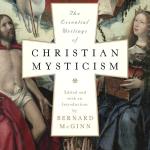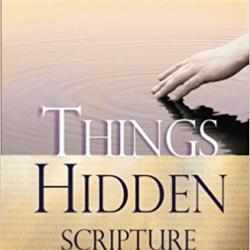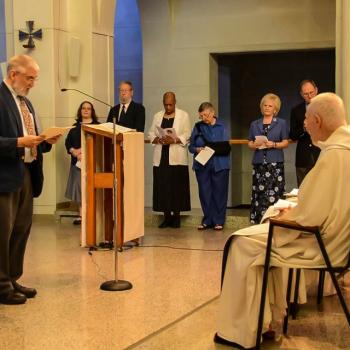A reader of this blog named Brian writes:
Carl,
How would you compare and contrast mysticism with gnosticism?
Thanks!
I suppose there are three ways to answer this question. First we’ll look at the historical sense of mysticism and gnosticism in the history of Christianity. Then, to bring it closer to the present day, we’ll consider how these words were used by a twentieth century Christian Hermetic writer, Valentin Tomberg. Finally, we can reflect on how we can make sense of these concepts in the here and now.
A Brief History of Two Opaque Words
If you go the doctor because you’re not feeling well, she will give you a diagnosis — in other words, she will identify what is probably wrong with you, based on your symptoms and her examination of your condition. Etymological dictionaries will tell you this word is a compound of two Greek roots: dia- meaning “thorough” and -gnosis meaning “knowledge.” So we can immediately surmise that gnosis — and, therefore, the spiritual movement Gnosticism — has something to do with knowledge. But not just any kind of knowledge! Again, back the etymology dictionary, where gnosis is described as follows:
gnosis (n.)
“knowledge,” especially “special knowledge of spiritual mysteries,” 1703, from Greek gnōsis “a knowing, knowledge; a judicial inquiry, investigation; a being known,” in Christian writers, “higher knowledge of spiritual things,” from PIE *gnō-ti-, from root *gno- “to know.” (Source: www.etymonline.com)
So gnosis implies a kind of “higher” or “spiritual” knowing, in contrast to another Greek word, εἴδειν (eídein) which means intellectual knowledge. It’s street smarts as opposed to book learning. Gnosis is an intuitive, feel-it-in-your-guts knowledge of spiritual things. A word often used in our time for this is experience. When we talk about the “experience of God,” we are taking about a direct knowing of God, as opposed to a second-hand knowledge (like reading about God in the Bible).
So what, then, is Gnosticism? Historically, it refers to an early heresy within Christianity: a teaching that was rejected by the Christian mainstream. History is written by the winners, and so our knowledge of gnosticism is shaped by the criticism of it penned by early Christian theologians. The problem with gnosticism, at least from a mainstream perspective, is that it promoted a dualistic way of seeing the material world as inferior to the spiritual world, even to the point of regarding material creation as evil in contrast to the goodness of pure spirit. This is clearly a Greek notion, for the Jewish tradition has a strong heritage of celebration God’s creation as essentially good, even if it is marred by sin.
What’s interesting to keep in mind is how some early Christian writers — including early Christian mystics — used the word gnosis in a positive way, to explain their understanding of the importance of experiential knowledge as part of the spiritual life. One example of this is Clement of Alexandria, widely regarded as one of the first mystics in the Christian tradition after the New Testament writers. Clement wrote several works where he attempted to explain the Christian mysteries using language and concepts borrowed from Greek spirituality.
So there’s the word mysteries which leads us to consider the root of mysticism. Unfortunately, the etymology dictionary is a mess when it comes to trying to unravel the origins of the words mystic, mystical and mysticism. So I’ll quote myself here, from The Big Book of Christian Mysticism:
To understand the history of Christian mysticism, we have to explore the origins of Christianity, in the context of the language, philosophy, and religion of the Hellenistic world in which the New Testament was written. The word “mysticism” comes from the Greek word mueo, which means “to close” or “to shut.” In “Mysticism: An Essay on the History of the Word,” French scholar Louis Bouyer says it refers to closing the eyes, while other sources suggest it refers to keeping your mouth shut. In fact, both of these meanings make sense. Yet another source suggests the word means “to initiate into the mysteries,” hence “to instruct.” Mysticism thus involves shutting, closing, and hiddenness, but also initiation, learning a secret, and keeping your mouth shut long enough to listen for what’s really going on.
Incidentally, that important essay by Louis Bouyer, “Mysticism: An Essay on the History of the Word” is found in an old anthology called Understanding Mysticism.
Unlike gnosticism, mysticism never emerged as a rival to mainstream Christianity (indeed, the word “mysticism” itself shows up relatively recently, only about 300 years ago). So at least historically speaking, we really are comparing apples and oranges. But for the sake of where we’re going (i.e., now do these words apply to spiritual practice today), I think it’s fair to say that gnosis/gnosticism applies to the direct experiential knowledge of spiritual things, including embodied knowledge of God whereas mystery/mysticism applies to the spirituality of encountering God’s essential unknowability, hiddenness, mysteriously, ineffability. At the risk of oversimplifying: gnosticism talks about experiencing God, while mysticism remains silent in awe before the ultimate mystery that some call God.
A Twentieth Century View
A Russian anthroposophist-turned-Catholic mystic named Valentin Tomberg (1900-1973) wrote a series of meditations on what he called “Christian Hermeticism” based on the 22 Major Arcana cards of the Tarot. Published anonymously after his death, Meditations on the Tarot became recognized as a modern mystical classic (despite its esoteric title and format). Thomas Keating, Basil Pennington, Bede Griffiths, Cynthia Bourgeault, Therese Schroeder-Sheker, and even Cardinal Hans Urs Von Balthasar were among the book’s many fans (I am currently leading a study course on the book for this blog’s Patreon supporters). We know the author was Tomberg, but he wanted to be anonymous, so let me refer to him as the “anonymous author.” Because of his own background studying topics like Kabbalah, Ceremonial Magic and Hermetic philosophy, this author was not afraid to use language that more timid orthodox theologians might avoid. So Meditations on the Tarot attempts to rehabilitate the concept of gnosticism, reclaiming it from its tragic history of an early heresy.
The author writes:
The essence of pure gnosis is reflected mysticism. Gnosis signifies that that which takes place in mysticism has become higher knowledge. That is, gnosis is mysticism which has become conscious of itself. It is mystical experience transformed into higher knowledge.
So here we begin to crack the nut of Brian’s question: how do we “compare and contrast” mystic and gnostic dimensions of spirituality? (I’m going to set aside for now the equation of gnosticism with heresy, since that is a historical reality that seems irrelevant for most spiritual seekers today). Meditations on the Tarot implies a kind of “sun and moon” analogy: if “gnosis is reflected mysticism,” then the luminous radiance of the pure encounter with the mystery of God is like the sun: the source of all light, yet it blinds us to look directly at it. Gnosis, meanwhile, is like the moon: reflecting the pure mystical light, making it more available to the human intellect but also resulting in a kind of self-consciousness that can undermine the spiritual search. Humility, after all, is a kind of self-forgetfulness, and if gnosis implies a kind of self-consciousness, there is a risk that gnosis could lead to ego-inflation and pride.
Mysticism and Gnosis in the 21st Century
So, how does this bring us to the present day? How do we compare mysticism and gnosticism for our time, and in a practical way to support our contemporary spiritual search? Given how squirrelly both of these topics are, I don’t know that I can provide a definitive answer. But Brian’s question was about how I compare and contrast these two topics, so all I can offer you are my own thoughts, presented here in a handy bullet point format, in no particular order:
- Gnosis does not have to be a dirty word, just because of the historical link to the heresy of gnosticism. Indeed, there are small groups hither and yon that describe themselves as modern day gnostics, gnostic Christians, etc. I don’t know how much they have in common with the gnosticism of 1800 years ago, so I’ll leave that for interested parties to explore for themselves. But from the perspective of Christian mysticism as it evolved over the centuries, I believe there’s a place for the search of knowledge and experience of God within the larger umbrella of mysticism, or the spirituality of responding to divine love.
- So much of the language of mysticism is embedded with mystery: the dark night of the soul, the cloud of unknowing, the hiddenness of divinity, and so forth. So there is a kind of existential tension between gnosis as the quest for knowledge of God and mysticism as a recognition that God is ultimately unknowable. Nevertheless, I think it’s only human nature to want an experience of God, so I think for many people the hunger for gnosis is a natural part of the desire for mystical or contemplative spirituality.
- I agree with this idea that gnosis can function as “self-conscious mysticism.” During centering prayer, we consent to God’s mysterious silence. It is not uncommon to experience moments — maybe even long moments — when thinking slows down and we experience what Cynthia Bourgeault calls “objectless awareness,” i.e., the pure unmediated presence of vast, limitless, silence. But to be in the presence of such silence is to be in a place beyond words and thoughts, in other words, a “hidden” place, hidden to ordinary human consciousness. As soon as we try to talk about, describe, or even think about such objectless experience, we fall from mysticism into gnosis. Mysticism is the pure wordless experience, gnosis is the attempt to think about it, understand it, describe it, talk about it.
- It’s important to resist the temptation to write gnosis off as merely a corruption of mysticism. I love the idea that gnosis is “mystical experience transformed into higher knowledge.” This maintains a kind of dignity about gnosis; after all, it is human nature to try to make sense of our experience, and to talk about it/share it with others. This is why so many mystics and contemplatives are writers — or voracious readers! Just as sports fans love to endlessly analyze and reflect on legendary games (or even legendary single plays), we contemplative seekers sure do love to read, write, talk, discuss, all about our experience in prayer. This is a good thing! It’s just helpful to remember that talking about prayer is different from simply praying (although to the extent that we seek to live a nondual life of pure prayer, than even the talking-about becomes a dimension of the prayer, but that is probably something we do not need to worry about in the early stages of our contemplative practice).
So, this is certainly not the final word on mysticism and gnosis! But the beauty of our world is illuminated by both the sun and the moon. We need both knowledge and silence, both experience and wonder, both intuition and inspiration. On her wonderful album Big Science, performance artist Laurie Anderson sang, “This is the time. And this is the record of the time.” Mysticism is the time (the timeless time). And gnosis is the record of the time.


















